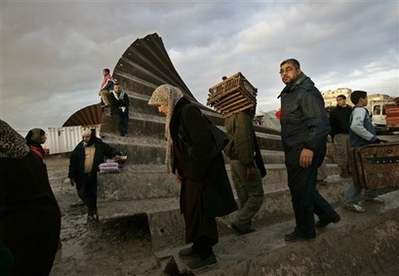And now they bring up you.
Here’s the opening of a MoveOn fundraising letter that I got just before going out of town last week. I’ve cut it off at the point where I stopped reading:
From: Nita Chaudhary, MoveOn.org Political Action <moveon-help@list.moveon.org>
Subject: 60 votes to win
Date: 3/19/2008 6:46 AMDear MoveOn member,
It’s happened again and again this year, on every issue we care about. Iraq. Health care. The climate crisis. Strong bills have sailed through the US House, only to stall in the face of Republican obstruction in the Senate. Republicans are on pace to double the Congressional record for the most filibusters.
Here’s the good news: Republicans are defending 23 Senate seats next year, compared to just 12 for the Democrats. Democrats could gain as many as 60 seats in the Senate, enough to break Republican filibusters and usher in a new era of progressive reform.
We’ve got a plan to take advantage of every seat that’s in play, make even more races competitive, and create a progressive majority that will last for a generation. But it’s going to take sustained support from you to pull it off and there’s no time to waste. Can you contribute $15 per month (you can cancel at any time) from now through Election Day?
Last year, the Senate Republicans obstructed numerous bills including stalling health insurance for the children who need it most and blocking a time-line to bring the troops home from Iraq.
Now look at some of the proposals from the Democratic presidential candidates that will almost certainly take 60 votes in the Senate to pass:
- No more blank checks in Iraq
. . .
I stopped reading here because this is a lie.
It does not take 60 votes in the Senate to pass No more blank checks in Iraq.
It does not take a filibuster-proof supermajority in the Senate — any more than it takes a veto-proof majority
in the House — to halt blank-check funding for the Iraq War.
It doesn’t take positive legislation of any kind at all to halt funding for the Iraq War; all that it takes is a lack of any more laws to keep on funding it, whether in the form of regular budget line items or in the form of the repeated off-the-ledger infusions of cash which go to fund the Occupation’s perpetual state of emergency.
Republican Senators can’t filibuster a non-bill and neither can President George W. Bush — or any President who might succeed him — veto it. It doesn’t take 60 Senators or 290 Representatives to stop bills from passing. All you need is a simple majority, which the Democrats already have, and have had for the last year and a half, and with which they have done worse than nothing over and over again.
The reason that those blank checks
keep getting written, with Democrat Harry Reid and Democrat Nacy Pelosi’s signatures right by the X, is because the Democratic leadership, so-called, doesn’t give enough of a damn about ending the war to take on the political costs of blocking funding for it. The only reason that they could possibly think that doing what they want depends on having a larger majority than they already have is if what they want to do is something other than halting war funding.
The Democratic leadership clearly wants a larger majority in Congress, and they are going to keep on giving George Bush every dollar he asks for unless and until they get that larger majority. They don’t need the larger majority to stop sending him the money, so one of two things must be true. Either the Democratic leadership is waiting until they consolidate more political power so that they can pass a plan which will prolong the war rather than ending it, or else they are waiting until they consolidate more political power because they don’t want to end the war until after they’ve fully exploited it as a campaign issue in the upcoming Congressional and Presidential elections. In either case, the strategy is despicable. And in either case, it’s shameful to see a putatively antiwar group repeating their opportunistic lies.
No union with war-mongers, spiritually or politically.

